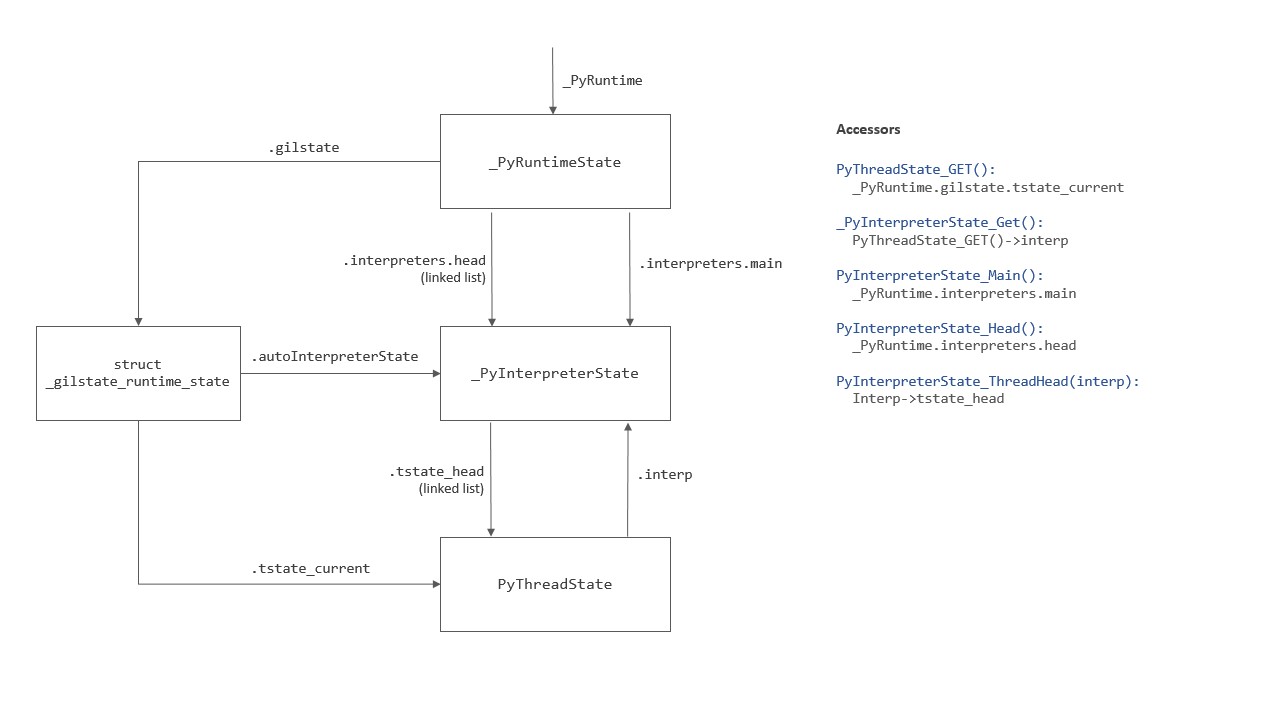Keep Your Fork, There's Pie
Today was my first day joining everyone else for EnHackathon, aiming to contribute to a couple of issues in the subinterpreter project.
My last large attempt at contributing to CPython was an experiment with
“unboxing” integers (i.e. encoding them into PyObject * pointer values rather
than actually allocating objects). Unfortunately it turned out that this
effectively reduced performance across the board by about 10%!1
It was good to have a compelling reason to look at some (different aspects) of the CPython internals again – the subinterpreter project has the potential to address some of the major missed use-cases for CPython, so it’s great to get involved.
1: It turns out that extra adding branches to the most frequently-used C APIs (e.g. INCREF and DECREF), regardless of which way the branch is predicted, is not great for performance!
Forking Subinterpreters
I started by looking at the issue about disallowing fork in subinterpreters. After catching up on discussion on github and bpo the situation seemed to be:
- Eric already had pushed changes to block calls to
fork()from any interpreter that’s not the main interpreter (i.e. exactly what we want!) - This broke mod_wsgi, so part of Eric’s changeset (in the subprocess module internals) was backed out.
- A follow-up change on issue37951 reintroduced the logic to block fork-exec in subprocess, but only if a pre-exec function is specified.
Where did this leave everything? Well, everyone on the bpo tracker seemed happy that the issue was fixed, but Eric’s latest comment on the github issue suggested that there might be more to do.
So the first thing to do was figure out what the latest state really was.
Deciphering Runtime State
Digging into the code to look at the various bits of runtime or interpreter state, it’s easy to get lost in a maze of interrelated objects and accessor functions.
To help us navigate this, I summarised the key bits visually as a point of reference:

Subprocess Calls In Subinterpreters
Back to the fork-ing issues: were there actually any problems remaining?
It turned out the answer to this was “no”, but it took me longer than I’d have hoped to come to this conclusion!
-
After calling
fork(), only the interpreter and thread that made the call survive in the child. -
The potential problem is if this interpreter was a subinterpreter rather than the “main” interpreter: there are various assumptions that there is a “main” interpreter.
-
However none of this is really an issue for the subprocess use of fork: exec is called almost immediately afterwards, wiping out the entire heap (and so all of the Python runtime state).
-
The only exception to this is if the (legacy)
preexec_fnparameter ofPopenis used: this is the only way that Python code can be executed after fork but before exec. So if we ban that, everything is ok!
Conclusion
My conclusion on all of this was that there’s no further code change needed,
just a small docs update to note the
change in os.fork() behaviour.
Pending Calls
One of the major changes needed for the overall subinterpreter project is moving state from the global runtime, to a per-interpreter granularity.
There’s another issue tracking one part of this: moving “pending” calls from the global runtime to be per-interpreter.
Running out of time towards the end of the day I started looking at the history of the issue, seeing a now-familiar pattern: Eric had pushed some sensible-looking changes to implement this, only to find that it broke a handful of tests in an unpredictable way on a small handful of platforms!
I didn’t have any time to look any deeper than this, but the outline of the problem looked interesting, essentially:
-
The regressions were crashes in interpreter finalisation during process exit: subinterpreters were being finalised after the main interpreter, and so trying to access freed global state.
-
There’s some discussion that this is probably related to daemon threads that (deliberately) refuse to exit during shutdown, together with some (mis)use of these in the multiprocessing module.
-
To make matters more difficult, nobody has managed to find a minimal test case to reproduce this, and nobody has managed to reproduce the problem at all on linux!
So no actual progress beyond digesting some history…but this could be an interesting problem to try and dig into in future!